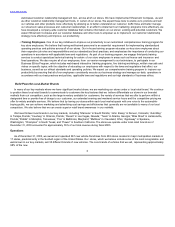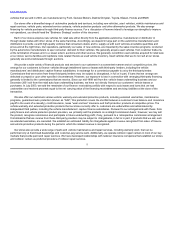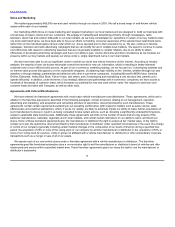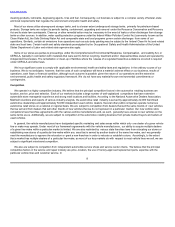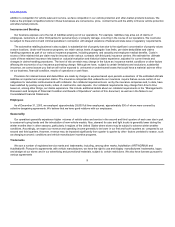AutoNation 2003 Annual Report Download - page 16
Download and view the complete annual report
Please find page 16 of the 2003 AutoNation annual report below. You can navigate through the pages in the report by either clicking on the pages listed below, or by using the keyword search tool below to find specific information within the annual report.
Table of Contents
manufacturers’ captive finance subsidiaries alleging discriminatory lending practices has resulted in settlements, and may result in future
settlements, that could adversely impact the fees earned by our stores in connection with the origination of consumer loans. Although we
believe that there are compelling arguments against measures of the sort described above, the enactment of laws and regulations that impair
or restrict our finance and insurance operations could have a material adverse effect on our business, results of operations, financial
condition, cash flows and prospects.
Our ability to grow our business may be limited by our ability to acquire automotive stores in key markets on favorable terms
or at all.
The automotive retail industry is a mature industry. Accordingly, the growth of our automotive retail business since our inception has
been primarily attributable to acquisitions of franchised automotive dealership groups. As described above, manufacturer approval of our
proposed acquisitions generally is subject to our compliance with applicable performance standards (including with respect to matters such as
sales volume, sales effectiveness and customer satisfaction) or established acquisition limits, particularly regional and local market limits. In
addition, in the current environment, it has been difficult to find dealership acquisitions in our core markets that meet our return on
investment targets, including due to the acquisition price expectations of sellers, and there can be no assurance that we will be able to find a
significant number of acquisition targets that meet our return thresholds in the future. As a result, we cannot assure you that we will be able
to continue to acquire stores selling desirable automotive brands at desirable locations in our key markets or that any such acquisitions can
be completed on favorable terms or at all. Acquisitions involve a number of risks, many of which are unpredictable and difficult to quantify or
assess, including, among other matters, risks relating to known and unknown liabilities of the acquired business and projected operating
performance.
We are subject to interest rate risk in connection with our floorplan notes payable, revolving credit facilities and mortgage
facilities that could have a material adverse effect on our profitability.
A significant increase in interest rates will cause our interest rates under our revolving credit facilities, mortgage facilities and certain of
our floorplan notes payable to increase. Although we expect increases in our interest rates under our floorplan notes payable to be partially
offset by increases in floorplan assistance from the automotive manufacturers and by interest rate hedge transactions that we enter into from
time to time, we cannot assure you that a significant increase in interest rates would not have a material adverse effect on our business,
financial condition, results of operations or cash flows.
Our revolving credit facilities and the indenture relating to our senior unsecured notes contain certain restrictions on our
ability to conduct our business.
The indenture relating to the $450.0 million of 9% senior unsecured notes that we sold in August 2001 and the credit agreements relating
to our two revolving credit facilities contain numerous financial and operating covenants that limit the discretion of our management with
respect to various business matters. These covenants place significant restrictions on, among other things, our ability to incur additional
indebtedness, to create liens or other encumbrances, to make certain payments (including dividends and repurchases of our shares) and
investments, and to sell or otherwise dispose of assets and merge or consolidate with other entities. Our revolving credit facilities also
require us to meet certain financial ratios and tests that may require us to take action to reduce debt or act in a manner contrary to our
business objectives. A failure by us to comply with the obligations contained in our revolving credit facilities or the indenture could result in an
event of default under our revolving credit facilities or the indenture, which could permit acceleration of the related debt and acceleration of
debt under other instruments that may contain cross-acceleration or cross-default provisions. If any debt is accelerated, our assets may not be
sufficient to repay in full such indebtedness and our other indebtedness. In addition, we have granted certain manufacturers the right to
acquire, at fair market value, our automotive stores franchised by that manufacturer in specified circumstances upon the exercise of
remedies under the indenture for our senior unsecured notes and the credit agreements for our two revolving credit facilities.
14


